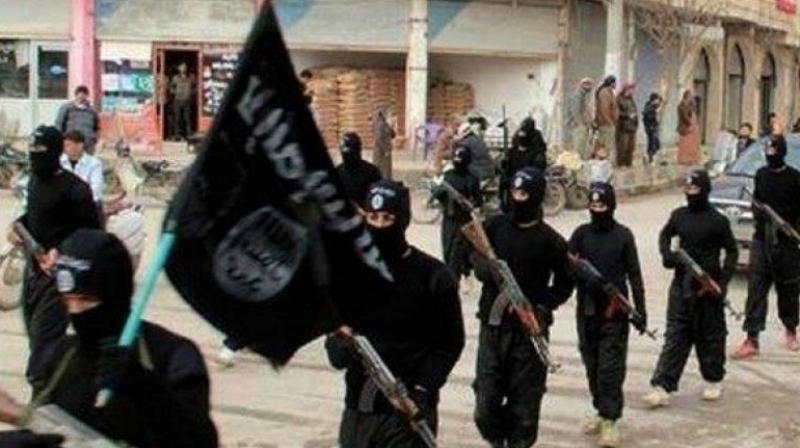Have focus on religio-moral deligitimisation of ISIS

At its peak in 2014, ISIS controlled an estimated 100,000 sq. km in the Syrian-Iraqi swathes, with another 10,000 sq. km globally through its affiliates in Libya, Egypt, Yemen, the Philippines, etc. Today it has shrunk to a total landmass of approximately 1,500 sq. km of besieged, fast-shrinking and splintered “pockets”. The multiple victors in the battles against ISIS have now shifted focus to fighting amongst themselves, with the Iranian Revolutionary Forces getting designated as a “terrorist organisation” by the US, the Arab sheikhdom-supported militias have turned on the Bashar Al-Assad-led Syrian Forces-Hezbollah combine, while the Turks are back to attacking the Kurdish People’s Protection Units (YPG). Amidst the ensuing chaos and far away from the ISIS-epicentre, a meticulously planned, executed and coordinated terror strike hit Sri Lanka, only to be claimed by ISIS as its handiwork.
Irrespective of the conclusive evidence to ascertain the quantum of “support” by the core ISIS in the Middle Eastern deserts and urban-ruins, the Sri Lankan government’s assertion of a “foreign hand” and the inspiration-value of the “Islamic State” in such global terror attacks are undeniable. A video showing the allegiance of the suicide bombers in Sri Lanka to ISIS’ Abu Bakr al-Baghdadi has happened at other instances of terror strikes across the world. The centrality-of-inspiration and decentrality-of-operations is the leitmotif of common religio-moral wars, as personified by the earlier avatar of the “Osama-Al Qaida” model, which was later replaced by the “Abu Bakr-ISIS” template. A very important component of the “Osama-Al Qaida” fade-away, besides its physical destruction, was the systematic religio-moral-deligitimisation, initiated by the Arab countries; post the wake-up call of the “Arab Spring”.
Unlike the relative unity displayed amongst regional and Western nations to delegitimise the “Osama-Al Qaida” construct, the premature distractions and sparring over the ruins of the territorial rout of “Abu Bakr-ISIS” is starkly different this time. The Middle East has always been a region of intrigues, checks-and-balances and insincere posturing that belies the reality behind the proclaimed passions. For all its public anti-Israeli posturing, the Arab leaders and their militias are singularly training their guns on the number one enemy of Israel i.e. Iran and its affiliates. The America-Israeli-Arab-Turkish quad has hurriedly relegated the “idea” of ISIS to the backburner, and even attempted to incredulously link the Iranian regime to ISIS, when ground realities suggest otherwise.
The historically suppressed angst-ire-faultlines in the region typically needs a government funnelled vent, a face and a nomenclature that was earlier afforded by the fear of “Osama-Al Qaida” — on which the Sheikhdoms had displayed a rare, internally driven and confessional effort. Whereas the “Abu Bakr-ISIS” realm benefits from a flurry of irrelevant “contexts” and urgencies that have propped up to redraw the new narrative — from “nuclearising” Saudi, ostracising Qatar, justifying Houthi-crackdowns, U-turns with the Taliban, etc., whilst selectively deploying the lever of religio-moral delegitimisation only for Iran. This, when none of the recent terror attacks across the globe have been traced back to Iran, and instead have their material, spiritual and inspirational wherewithal within the sanctified precincts of the sheikhdoms, itself. Soon the ISIS “caliphate” may not have the financial, material and territorial resources to sustain itself, let alone those “inspired groups” in heterogeneous places like Sri Lanka. However, without dousing the ideological, emotional and philosophical pull of the “caliphate” and its portents from the collective conscience and imagination of the aggrieved ummah, terror strikes like Sri Lanka will always loom.
Iran cannot, and should not, replace “Abu Bakr-ISIS” as the necessary regional “enemy” — as the enemy lurks within the Arab framework which has forever contextualised the imminence of Samuel Huntington’s “Clash of Civilisations”. The civilisational clash if any, is within the feudal-medieval mindset within the Arabian leadership that sanctions the public execution of 37 in a day, without any punitive international outrage. Such state-sponsored bloodshed numbs the senses and normalises religious extremism, which can then be appropriated and extended by terrorists to justify any terror attack in the name of faith. While a historical analyses and detailed fact-finding of the genealogical reasons will never be fully allowed, for it would expose all regional and Western powers, some degree of internal introspection and state-sponsored delegitimisation of ISIS is still pending, instead of conveniently tagging Tehran as “terror sponsors”. The task of delegitimising ISIS is a collective necessity, requiring all the A
rab sovereign resources, be it in the form of religious/clerical edicts, societal “inclusivity” that disowns sectarian divides, and the platforming of genuine societal concerns. Normalising relations with Iran will only expedite the downfall of revisionist tendencies and inspirations, as opposed to burying the hatchet with the likes of the Taliban or ignoring the “idea” of ISIS — a lesson that neither the US understood after patronising Afghan mujahedeens in the 1980s, nor the Arab Sheikhs understood while exporting Wahhabism across the world. The Sri Lanka terror attack reiterates the real problem area, again. Like the 9/11 perpetrators, the terrorists in the Sri Lankan attack were not ignorant, illiterate or financially desperate — they were just convinced of the righteousness and religio-moral sanctification of their terror act.
The writer is a retired lieutenant-general and a former lieutenant-governor of Andaman & Nicobar Islands and Puducherry

